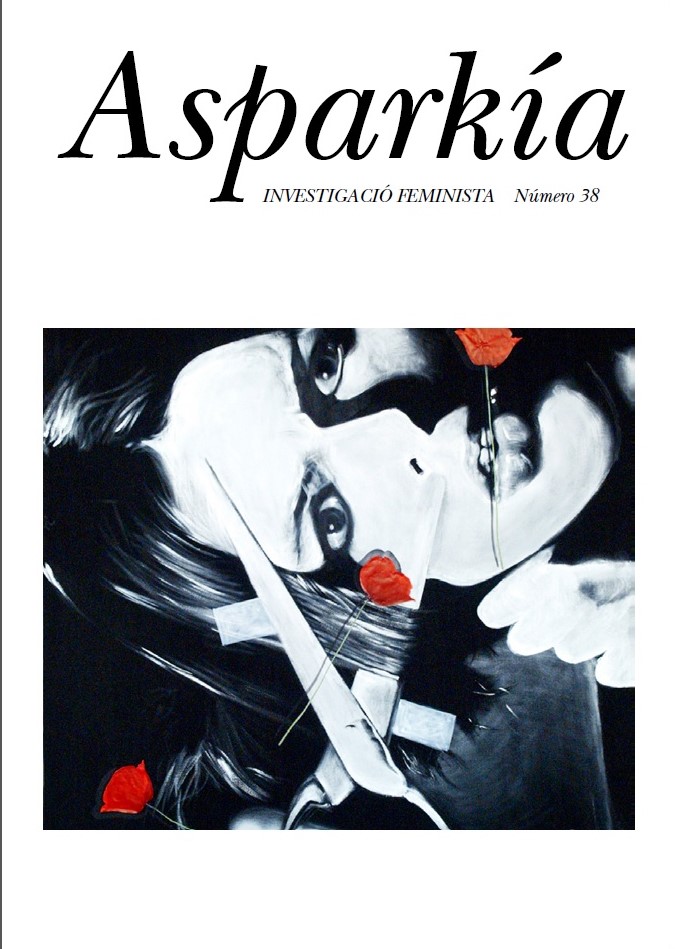Del privat al públic: Estudi de les relacions de gènere en el sistema patriarcal fang de Guinea Equatorial
##plugins.themes.bootstrap3.article.main##
Resum
El present article té l'objectiu de dur a terme una anàlisi sobre les relacions de gènere en el sistema patriarcal fang, les quals estan marcades per la diferenciació dels espais privat (per a les dones) i públic (per als homes). Per a aquesta anàlisi, s'ha utilitzat una metodologia descriptiva, la qual ens ha permès a través de la revisió bibliográfica, argumentar sobre la qüestió que ací s'aborda. Un dels principals resultats d'aquesta investigació està a haver posat de manifest que la dona fang ha estat confinada en l'espai privat o la casa-cuina, on servia per a parir fills i dedicar-se a cura de la llar. Les idees d'emancipació de la dona que pregona la ideologia feminista han propiciat que en la societat ecuatoguineana, les dones es proposen despatriarcalizar la cultura androcentrista que les ha estades infravalorant. Per això, és important estabilitzar els assoliments obtinguts fins ara.
Descàrregues
##plugins.themes.bootstrap3.article.details##
Referències
ARMIÑO, Luis Pérez. (2018 ). Y el sujeto se hizo verbo (aunque siempre fue objeto). Anales del Museo Nacional de Antropología, XIX. Madrid: Ministerio de Educación, Cultura y Deporte, 30-59.
BITUGA-NCHAMA, Pedro Bayeme. (2020). La conflictividad de la ideología feminista en la cultura fang: una aproximación al estudio del patriarcado en Guinea Ecuatorial. Revista Cátedra, 3(1), 15-27.
BOLEKIA BOLEKÁ, Justo. (2003). Aproximación a la historia de Guinea Ecuatorial. Salamanca: Amarú.
BOSCH, Esperanza., & Ferrer, Victoria. (2003). Fragilidad y debilidad como elementos fundamentales del estereotipo tradicional femenino. Feminismos, núm 2.
CASTELLS, Manuel. (1998 ). La era de la información. México: Siglo XXI.
ELÓSEGUI, María. (2011). Diez temas de género. Hombre y Mujeres ante los derechos productivos y reproductivos. Madrid: Ediciones Internacionales Universitarias.
ESONO MITOGO, Pancracio. (1990). El hombre y la costumbre. Madrid: UNED.
MANUEL, Castells. (2000). La era de la información. Volumen III: El poder de la identidad. México: Siglo XXI.
MBANA NCHAMA, Joaquín. (2011). Las imágenes públicas de la mujer fang en Guinea Ecuatorial. En Juan Ramón Aranzadi (coord.): II Jornadas de Antropología de Guinea Ecuatorial. Madrid Las imágenes públicas de la mujer fang en Guinea Ecuatorial». En Juan: Universidad Nacional de Educación a Distancia, pp. 121-130.
MBITI, John. (1991). Entre Dios y el Tiempo. Religiones Tradicionales Africanas. Madrid: Mundo Negro.
NGUEMA BILOGO, Longinos Eseng. (2012). La inculturación en el pueblo fang un paradigma de evangelización de África. Tesis de doctorado. Barcelona: Universidad de Barcelona.
NSANG OVONO, Carlota. (2018). Las formas del matrimonio bantú en Guinea Ecuatorial. Madrid: Dykinson, S.L.
NVÉ BENGOBESAMA, Constantino Ocháa. (1981). Tradiciones del pueblo fang. Madrid: RIALP, S.A.
NZÉ ABUY, Rafael María. (1984). Nsoa o Dote Africana. Madrid: Instituto Politécnico Salesianos-Atocha.
NZE ABUY, Rafael María. (1985). Familia y matrimonio fán. Madrid: Anzós, S. A.
ONDÓ NDJENG, Fernando Ignacio. (2013). Crisis matrimonial hoy en África: Síntesis histórico-doctrinal. Madrid,: Imprenta Tomás Hermanos.
TESSMANN, Gunter. (2003). Los pamues (los fang). Alcalá de Henares: Ed. a cargo de José Manuel Pedrosa.
VALCÁRCEL, Amelia. (1991). Sexo y filosofía: sobre mujer y poder. Barcelona,: Anthropos.
VARELA, Nuria. (2005 ). Feminismo para principiantes. Barcelona: Ediciones B.


